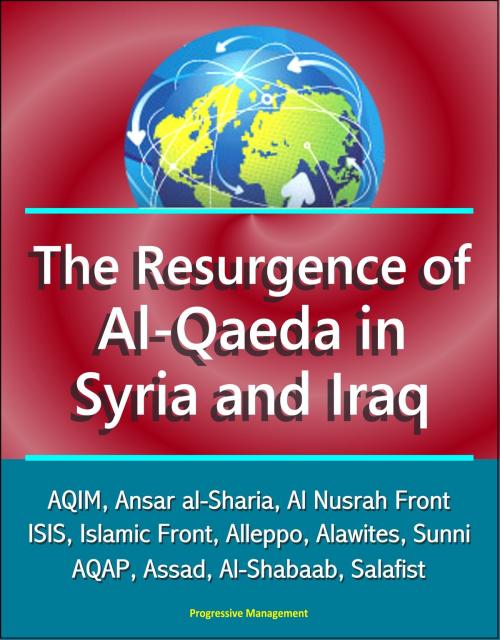The Resurgence of Al-Qaeda in Syria and Iraq: AQIM, Ansar al-Sharia, Al Nusrah Front, ISIS, Islamic Front, Alleppo, Alawites, Sunni, AQAP, Assad, Al-Shabaab, Salafist
Nonfiction, History, Military, Social & Cultural Studies, Political Science| Author: | Progressive Management | ISBN: | 9781311876980 |
| Publisher: | Progressive Management | Publication: | May 20, 2014 |
| Imprint: | Smashwords Edition | Language: | English |
| Author: | Progressive Management |
| ISBN: | 9781311876980 |
| Publisher: | Progressive Management |
| Publication: | May 20, 2014 |
| Imprint: | Smashwords Edition |
| Language: | English |
By 2010, it was possible to see al-Qaeda as an organization in decline. It had lost militarily in Iraq and seemed politically irrelevant to the popular revolts during the Arab Spring. However, the Syrian civil war has allowed it to rebuild and, in the form of the local Al Nusrah Front, use a revised political and military strategy. This important monograph considers if these apparent gains can be sustained or whether al-Qaeda's ideology will again alienate other salafist groups and the wider Sunni population.
Dr. Azeem Ibrahim bases his report on available evidence, interviews, and visits to Syria. At the moment, the Assad government seems to be making some gains, and the rebel forces are split into three broad groups of the Free Syrian Army, the Islamic Front (backed by the Gulf States), and two al-Qaeda groups (Al Nusrah and the Islamic State in Iraq and Syria [ISIS]). ISIS has alienated all the other factions and is likely to retreat to Iraq, but the Al Nusrah Front is operating in a loose alliance with the Islamic Front. What is not clear is if Al Nusrah's approach of seeking to cooperate with other Islamist groups and of trying to build popular support will allow it to make the substantial territorial gains that al-Qaeda has been seeking since it fled Afghanistan.
Dr. Ibrahim argues that this attempt is likely to fail. Even though Al Nusrah has shown a willingness to cooperate with the Islamic Front, the latter is likely to have to reject any long-term alliance with Al Nusrah if it wishes to retain funding from the Saudis and the Gulf States. In itself, ensuring that al-Qaeda remains marginalized will do little to help Syrians suffering the 4th year of civil war, nor will it eliminate the risk of radicalized foreign fighters returning to their home countries. However, it does suggest that al-Qaeda's relative resurgence since 2010 will be limited, and the organization as a whole will be no closer to its desire to reestablish territorial control over a large region where it can operate with relative safety. The Strategic Studies Institute offers this monograph for consideration in the ongoing discussion regarding al-Qaeda and the organizations affiliated with it.
Topics and subjects covered include: AQIM, Ansar al-Sharia, Al Nusrah Front, ISIS, Islamic Front, Alleppo, Alawites, Sunni, AQAP, Assad, Al-Shabaab, Salafist
By 2010, it was possible to see al-Qaeda as an organization in decline. It had lost militarily in Iraq and seemed politically irrelevant to the popular revolts during the Arab Spring. However, the Syrian civil war has allowed it to rebuild and, in the form of the local Al Nusrah Front, use a revised political and military strategy. This important monograph considers if these apparent gains can be sustained or whether al-Qaeda's ideology will again alienate other salafist groups and the wider Sunni population.
Dr. Azeem Ibrahim bases his report on available evidence, interviews, and visits to Syria. At the moment, the Assad government seems to be making some gains, and the rebel forces are split into three broad groups of the Free Syrian Army, the Islamic Front (backed by the Gulf States), and two al-Qaeda groups (Al Nusrah and the Islamic State in Iraq and Syria [ISIS]). ISIS has alienated all the other factions and is likely to retreat to Iraq, but the Al Nusrah Front is operating in a loose alliance with the Islamic Front. What is not clear is if Al Nusrah's approach of seeking to cooperate with other Islamist groups and of trying to build popular support will allow it to make the substantial territorial gains that al-Qaeda has been seeking since it fled Afghanistan.
Dr. Ibrahim argues that this attempt is likely to fail. Even though Al Nusrah has shown a willingness to cooperate with the Islamic Front, the latter is likely to have to reject any long-term alliance with Al Nusrah if it wishes to retain funding from the Saudis and the Gulf States. In itself, ensuring that al-Qaeda remains marginalized will do little to help Syrians suffering the 4th year of civil war, nor will it eliminate the risk of radicalized foreign fighters returning to their home countries. However, it does suggest that al-Qaeda's relative resurgence since 2010 will be limited, and the organization as a whole will be no closer to its desire to reestablish territorial control over a large region where it can operate with relative safety. The Strategic Studies Institute offers this monograph for consideration in the ongoing discussion regarding al-Qaeda and the organizations affiliated with it.
Topics and subjects covered include: AQIM, Ansar al-Sharia, Al Nusrah Front, ISIS, Islamic Front, Alleppo, Alawites, Sunni, AQAP, Assad, Al-Shabaab, Salafist















